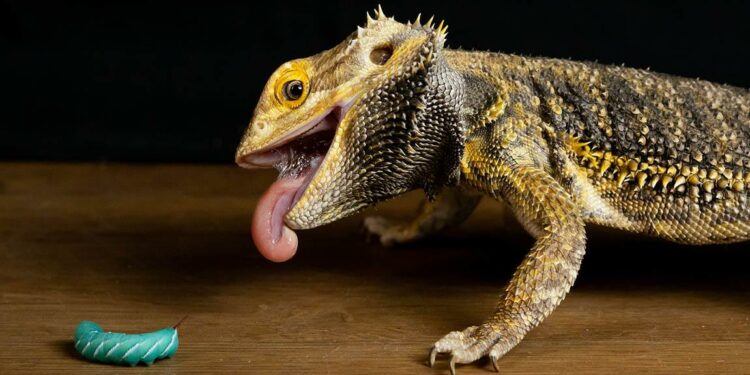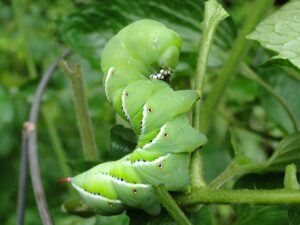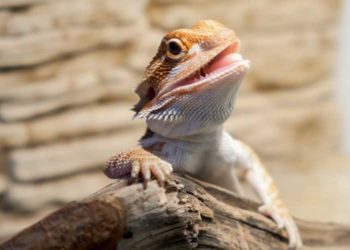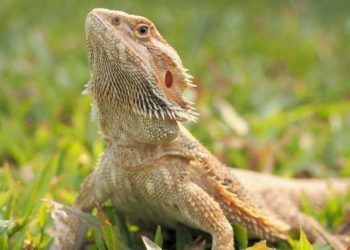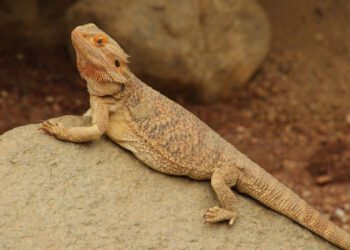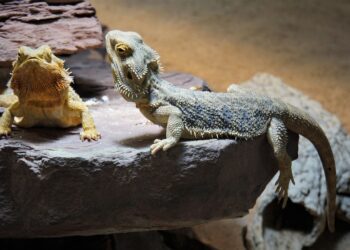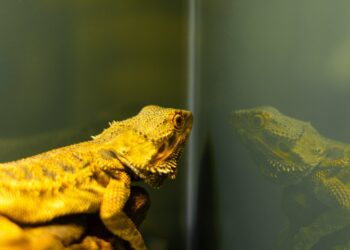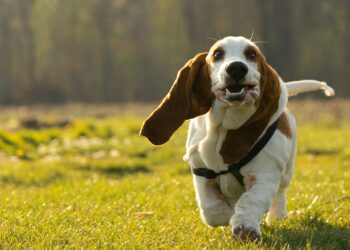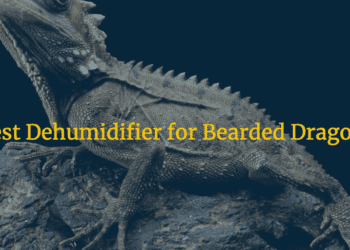Yes, bearded dragons can eat hornworms but not as a staple food. Bearded dragons are omnivores in nature and can eat both plants and animals based on food. The reason for eating hornworms by bearded dragons is that they have a significant nutritional value.
They contain a reasonable amount of protein, a good level of calcium content minimal fat, and almost no ash. They are considered safe for bearded dragons to eat and do not have any poison parts for hornworms. Hornworms are a kind of caterpillars that usually eat tomato plants mostly. Hornworms should be offered occasionally like once a week to the bearded dragons because eating too much can harm the health of bearded dragons.
Hornworms are very large in the size and eating in small quantities is enough for bearded dragons. They should be mixed with other insects like crickets and earthworms while serving to the dragons and 3-5 hornworms are enough for an adult dragon.
Contents
Nutritional data of hornworms for bearded dragons
The following data shows the nutritional value of hornworms for bearded dragons.
- Protein – 9%
- Fat – 3%
- Calcium – 46mg
- Moisture – 85%
Hornworms are high in calcium as compared to any other feeder insects for bearded dragons. They are very high in calcium amount so they do not need any added nutrients. They are also low in proteins and fats and therefore cannot be relying on the hornworm as a staple food for bearded dragons.
Best way to feed hornworms to bearded dragons
It is an easy thing to serve hornworms to the bearded dragon but you have to consider a few things while feeding.
- The first thing is you should feed hornworms alive to the bearded dragons as they find it interesting to catch them first and then eat them.
- The next thing you should keep in mind is that you have to feed hornworms mixed with some other food like other insects for example crickets, earthworms, or salad including green veggies. Adding those things that dragon loves to eat anytime is better.
- You can hang hornworms in front of a bearded dragon so that dragon will stimulate to snatch the food immediately after providing food in their place.
- You cannot rely on the hornworms alone as they are not a well-balanced diet for a healthy bearded dragon so need to mix them with good nutritional food that will compensate for the lack of nutrients of hornworms.
- You should remove the uneaten hornworms after 10-15minutes because rotten ones can affect the health of bearded dragons.
How many hornworms a bearded dragon can eat?
Hornworms are good for the health of bearded dragons also they are costly and nutritious but cannot fulfill all the nutritional demands of dragons. Also, the presence of high moisture in them makes them an occasional treat for other animals and insects.
But dragons also love to eat hornworms very much so you can feed once or a week to them. Too much of anything is not good always so feeding in limited quantities is better for the health of your pet. But hornworms provides add a good amount of calcium to a beardies diet as they are high in calcium content.
For a juvenile, you can offer hornworms daily as they need a high amount of calcium and moisture in their diet so feeding them insects is necessary and you can feed 3-5 hornworms to them. But for an adult, the insect intake decreases and they also need equal plant-based food so you should feed them hornworms occasionally as a treat.
Comparing domestic dragons with the wild ones, they should eat less than the wild bearded dragons as they live mostly in a cage and cannot burn their fat that much which can lead to obesity.
Can bearded dragons eat dried and dead hornworms?
Yes, a bearded dragon can eat both dried and dead hornworms but the problem is that they are not as nutritious for your pt dragon as the live one. On the other hand, dried hornworms are not easily available as there aren’t suppliers of dried ones. Eating dead hornworms in excess can cause the possibility of salmonella poisoning which can badly affect the health of bearded dragons.
Can baby dragons eat hornworms?
Yes, baby dragons can eat hornworms and in fact, it is suggested to feed an insect-based diet more to juveniles than the adult ones. Juvenile bearded dragons require almost 80% of the insects-based diet and around 20% plant-based diet and on the other hand, an adult bearded dragon requires just 20% insect-based diet but 80% plant-based diet.
You should feed hornworms to the baby bearded dragons but mix them with some other insects or veggies to give them a completely balanced diet of nutrients.
Are hornworms good for bearded dragons?
Many things make hornworms a good diet for bearded dragons. They are as follows:
- Hornworms are low in fat content and on the other hand high in calcium content which is beneficial for the good health of bearded dragons. But high amount of calcium intake on the daily basis is not good and can affect the health of the bearded dragon. Therefore it is important to provide an adequate amount of calcium to your pet.
- Hornworm grows faster and will take short time to reach their appropriate size for feeding to the dragons. You can easily buy them and they are available in almost all the stores and you can buy them and feed them at any time.
- Lack of calcium can cause metabolic bone disease which is a serious condition and can kill the bearded dragon. Hornworms being rich in calcium prevent them from such diseases.
- Hornworms have a good amount of moisture content which helps a dragon to stay hydrated and becomes an extra source of water for them.
- They are low in proteins but mixing with other food on your bearded dragon’s menu will offer a great diet for your pet.
Disadvantages of hornworms for bearded dragons
Hornworms make a tasty diet for bearded dragons but it has some disadvantages also which as a pet owner you should know and keep in your mind. They are costly as well as do not provide that much nutritional value alone to the pet. They are low in proteins, expensive, and high water content present on them can lead to problems in the pet. There are various other disadvantages of hornworms which are discussed below.
1. Create digestive issues in the pet:
High water content present in the hornworms can create some digestive issues in the dragons like diarrhea. They are a good source to keep a dragon hydrated but feeding an excess amount can lead to various health problems in the pet.
2. Hornworms grow very quickly:
This is one of the issues with the hornworms that they can grow very fast to their required size because in a week they can grow up to double their size. It is a problem for smaller bearded dragons as it is recommended that a bearded dragon should not eat anything bigger than their eye’s size.
3. Expensive:
This is also one of the problems with hornworms as they are very expensive because pets need a large number of insects each day in their diet. This is one of the reasons for feeding them occasionally to the pet.
4. Low protein with high water content:
They cannot be a good source of protein as they offer only 9% proteins for bearded dragons and also contains 85% of water which is too high.
Wrapping Up
The conclusion is that bearded dragons can eat hornworms but occasionally as a treat as they have some disadvantages also like they are low in proteins and very high in water content. The best thing is they are low in fats and high in calcium content which is beneficial for the bearded dragon’s health.
Feeding in moderation is good and mixing with other insects and veggies and serving as a salad provides a good amount of nutrients to the bearded dragon.


